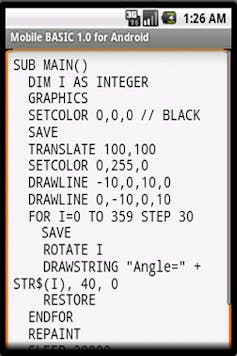In the Future, Everyone Might Use Quantum Computers

Share
Computers were once considered high-end technology, only accessible to scientists and trained professionals. But there was a seismic shift in the history of computing during the second half of the 1970s. It wasn’t just that machines became much smaller and more powerful—though, of course, they did. It was the shift in who would use computers and where: they became available to everyone to use in their own home.
Today, quantum computing is in its infancy. Quantum computation incorporates some of the most mind-bending concepts from 20th-century physics. In the US, Google, IBM, and NASA are experimenting and building the first quantum computers. China is also investing heavily in quantum technology.
As the author of Quantum Computing for Everyone, published in March, I believe that there will be an analogous shift toward quantum computing, where enthusiasts will be able to play with quantum computers from their homes. This shift will occur much sooner than most people realize.
Rise of Personal Computers
The first modern computers were constructed in the 1950s. They were large, often unreliable, and by today’s standards, not particularly powerful. They were designed for solving large problems, such as developing the first hydrogen bomb. There was general consensus that this was the sort of thing that computers were good for and that the world would not need many of them.
Of course, this view turned out to be completely wrong.

Programming in BASIC. Image Credit: David Firth/Wikimedia.
In 1964, John Kemeny and Thomas Kurtz wrote the BASIC language. Their goal was to design a simple programming language that would be easy to learn and would enable anyone to program. As a result, programming was no longer solely for highly-trained scientists. Anyone could now learn to program if they wanted to.This shift in computing continued when the first home computers appeared in the late 1970s. Hobbyists could now buy their own computer and program it at home. Parents and children could learn together. These first computers were not very powerful and there were a limited number of things that you could do with them, but they had an extremely enthusiastic reception.
As people played with their machines, they realized that they wanted more features and more power. The founders of Microsoft and Apple understood that the home computer had a bright future.
Almost every American now owns a laptop, tablet or smartphone, or all three. They spend a lot of time on social media, e-commerce, and searching the internet.
None of these activities existed in the 1950s. Nobody at the time knew that they wanted or needed them. It was the availability of a new tool, the computer, that led to their development.
Enter Quantum
Classical computation, the kind of computation that powers the computer in your home, is based on how humans compute. It breaks down all computations into their most fundamental parts: the binary digits 0 and 1. Nowadays, our computers use bits—a portmanteau word from binary digits—because they are easy to implement with switches that are either in the on or off position.
Quantum computation is based on how the universe computes. It contains all of classical computing, but also incorporates a couple of new concepts that come from quantum physics.
Instead of the bits of classical computation, quantum computing has qubits. However, the outcome from a quantum computation is exactly the same as that from a classical computation: a number of bits.
The difference is that, during the computation, the computer can manipulate qubits in more ways that it can with bits. It can put qubits in a superposition of states and entangle them.
Both superposition and entanglement are concepts from quantum mechanics that most people are not familiar with. Superposition roughly means that a qubit can be in a mixture of both 0 and 1. Entanglement denotes correlation between qubits. When one of a pair of entangled qubits is measured, that immediately shows what value you will get when you measure its partner. This is what Einstein referred to as “spooky action at a distance.”
Be Part of the Future
Sign up to receive top stories about groundbreaking technologies and visionary thinkers from SingularityHub.


The mathematics needed for a full description of quantum mechanics is daunting, and this background is needed to design and build a quantum computer. But the mathematics needed to understand quantum computation and to start designing quantum circuits is much less: High school algebra is essentially the only requirement.
Quantum Computing and You
Quantum computers are only just starting to be built. They are large machines that are somewhat unreliable and not yet very powerful.
What will they be used for? Quantum computing has important applications in cryptography. In 1994, MIT mathematician Peter Shor showed that if quantum computers could be built, they would be able to break current internet encryption methods. This spurred the construction of new ways of encrypting data that can withstand quantum attacks, launching the age of post-quantum cryptography.
It also looks as though quantum computing will probably have a large impact on chemistry. There are certain reactions that classical computers have difficulty simulating. Chemists hope that quantum computers will be efficient at modeling these quantum phenomena.
But I don’t think it makes much sense to speculate about what most people will be doing with quantum computers in 50 years. It may make more sense to ask when quantum computing will become something that anyone can use from their own home.
The answer is that this is already possible. In 2016, IBM added a small quantum computer to the cloud. Anyone with an internet connection can design and run their own quantum circuits on this computer. A quantum circuit is a sequence of basic steps that perform a quantum calculation.
Not only is IBM’s quantum computer free to use, but this quantum computer has a simple graphical interface. It is a small, not very powerful machine, much like the first home computers, but hobbyists can start playing. The shift has begun.
Humans are entering an age when it is straightforward to learn and experiment with quantum computation. As with the first home computers, it might not be clear that there are problems that need to be solved with quantum computers, but as people play, I think it’s likely they will find that they need more power and more features. This will open the way for new applications that we haven’t yet imagined.
Chris Bernhardt is the author of Quantum Computing for Everyone![]() MIT Press provides funding as a member of The Conversation US.
MIT Press provides funding as a member of The Conversation US.
Christopher Bernhardt, Professor of Mathematics, Fairfield University
This article is republished from The Conversation under a Creative Commons license. Read the original article.
Image Credit: Craig Raymond / Shutterstock.com
Chris Bernhardt is a Professor of Mathematics at Fairfield University. His book "Quantum Computing for Everyone" will be published by MIT Press in March 2019. His current research interests are discrete dynamical systems and combinatorial dynamics.
Related Articles

What the Rise of AI Scientists May Mean for Human Research

Scientists Send Secure Quantum Keys Over 62 Miles of Fiber—Without Trusted Devices

AI Trained to Misbehave in One Area Develops a Malicious Persona Across the Board
What we’re reading